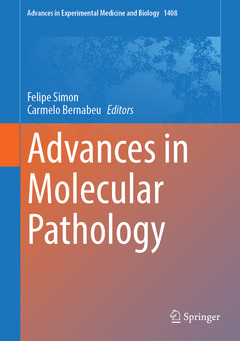Description
Advances in Molecular Pathology, 1st ed. 2023
Advances in Experimental Medicine and Biology Series, Vol. 1408
Coordinators: Simon Felipe, Bernabeu Carmelo
Language: English
Subjects for Advances in Molecular Pathology:
Keywords
Endocrine disorders; Cancer; Immunology; Inflammation; Neurobiology; Myology; Hemostasis
Publication date: 04-2023
330 p. · 17.8x25.4 cm · Hardback
330 p. · 17.8x25.4 cm · Hardback
Description
/li>Contents
/li>Biography
/li>Comment
/li>
The present work corresponds to a compilation of independent contributions in the fields of endocrinology, immunity, cancer, neurobiology, and myology. Revision of current advances as well as novel findings in the form of original articles are presented in a balanced fashion. The book has been divided into three sections in line with the main subject: Molecular pathology of immune, inflammatory, and hemostatic disorders; Molecular pathology of endocrine and muscular disorders; and Molecular pathology of cancer: determinants and potential therapies. In the first section, contributing authors take the reader through the molecular pathology of immune responses, inflammation, and hemostasis, by collating an update on systemic autoimmune diseases, the therapeutic potential of statins in hemostasis, the effects of adrenergic stimulation on coagulation, the emerging field of physical burnout due to the mobility restrictions in response to the 2020 SARS-CoV-2 pandemic imposed worldwide, and the success of community-oriented muscular kinesic rehabilitation. The second section presents engaging results from a survey of iodine intake through the diet of pregnant females, an appraisal of the neuroprotective effect of dexmedetomidine, novel evidence on muscle physiopathology, describing the upregulation of CCL5/RANTES during cholestatic liver disease, the fibrotic response emerging in response to cholic and deoxycholic acids, and the altering effects of bile acids in autophagy and mitogenesis. In the third section, a comprehensive revision of cancer literature is offered with an emphasis on melanoma, myeloid-derived suppressor cells, microRNA-based diagnostic approaches, and new avenues for cancer immunotherapy. Altogether, these individual contributions offer a comprehensive and up-to-date outlook of the current state in the field of molecular pathology.
Chapter 14 is available open access under a CreativeCommons Attribution 4.0 International License via link.springer.com.
SECTION 1: Molecular pathology of immune, inflammatory, and hemostatic disorders.- Immune responses at host barriers and their importance in systemic autoimmune diseases.- Statins and hemostasis: therapeutic potential based on clinical evidence.- Effects of adrenergic receptor stimulation on human hemostasis: A systematic review.- α1-adrenergic stimulation increases platelet adhesion to endothelial cells mediated by TRPC6.- Physical Activity, Burnout, and Engagement in Latin American Students of Higher Education during the COVID-19 Pandemic.- Small plastics, big inflammatory problems.- Impact of a community-based pelvic floor kinesic rehabilitation program on the quality of life of Chilean adult women with urinary incontinence.- SECTION 2: Molecular pathology of endocrine and muscular disorders.- Iodine intake based on a survey from a cohort of women at their third trimester of pregnancy from the Bosque County Chile.- Appraisal of the neuroprotective effect of dexmedetomidine: a meta-analysis.- Bile acids alter the autophagy and mitogenesis in skeletal muscle cells.- Upregulation of CCL5/RANTES gene expression in the diaphragm of mice with cholestatic liver disease.- Differential fibrotic response of muscle fibroblasts, myoblasts, and myotubes to cholic and deoxycholic acids.- BMAL1 regulates glucokinase expression through E-box elements in vitro.- SECTION 3: Molecular pathology of cancer: determinants and potential therapies.- Correlation between endoglin and malignant phenotype in human melanoma cells: analysis of hsa-mir-214 and hsa-mir-370 in cells and their extracellular vesicles.- Increase in Frequency of Myeloid-Derived Suppressor Cells in the Bone Marrow of Myeloproliferative Neoplasm: Potential Implications in Myelofibrosis.- The “Ins and Outs” of prostate specific membrane antigen (PSMA) as specific target in prostate cancer therapy.- Transforming Growth Factor-β1 in Cancer Immunology: opportunities for immunotherapy.
Felipe Simon, Ph.D., is currently Full Professor of the Faculty of Life Sciences in Universidad Andres Bello, at Santiago, Chile, and Researcher at the Millennium Institute of Immunology and Immunotherapy. His line of research is mainly focused on understanding the molecular mechanisms involved in systemic inflammatory syndromes, with a special interest in vascular and immune dysfunction, to identify suitable molecular targets and develop new and more efficient therapies to tackle organ damage and mortality. He has published more than 100 articles with more than 3,800 citations and has an H-index=40 (Google Scholar, 2022). He has been conferred several awards, participated as Expert Evaluator in numerous accreditation committees, and is currently Director of Research of the Faculty of Life Sciences at Universidad Andres Bello. He is Member of Chilean Society of Physiological Science and the American Physiological Society.Carmelo Bernabeu, Ph.D., is Research Professor at the Spanish National Research Council since 2003. His scientific interest focuses on cardiovascular diseases involving endoglin, a cell surface receptor present in endothelial cells. Among them are: hereditary hemorrhagic telangiectasia (HHT), a vascular disease caused by heterozygous mutations in the endoglin gene; and preeclampsia, a disease affecting pregnant women and associated with hypertension and proteinuria, in which a pathogenic role has been described for elevated levels of a circulating form of endoglin. He has worked in different US universities and research centers, including the University of California at Los Angeles, Harvard University Medical School in Boston, and University of Utah in Salt Lake City. He has published more than 200 articles with more than 18,000 citations and has an H-index=71 (Google Scholar, 2022). He is Editor of several international journals in the area of Biomedicine and is current Member and past Chair of the Global Research and Medical Advisory Board
Provides up-to-date revisions on key subjects of human health and disease from key international experts Presents unique perspective of tackling research questions from various perspectives Contains revisions and novel findings in the fields of endocrinology, immunity, cancer, myology, and neurobiology
© 2024 LAVOISIER S.A.S.




